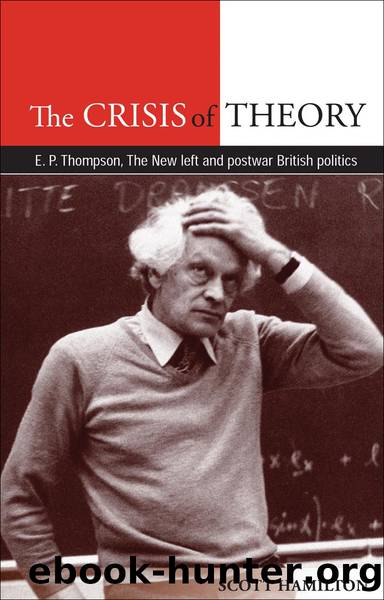The Crisis of Theory by Scott Hamilton;

Author:Scott Hamilton; [Hamilton;, Scott]
Language: eng
Format: epub
ISBN: 9780719084355
Publisher: ManchesterUP
Published: 2011-09-15T05:00:00+00:00
âAn exercise in attacking the leftâ?
Thompsonâs criticisms of the New New Left and of trendy Continental Marxists like Sartre and Althusser did not win him many friends. Writing in History Workshop Journal a quarter century later, Jonathan Ree remembered the reaction of his friends and colleagues to the âOpen Letterâ:
They regarded socialist humanism as obsolete, and EP Thompson as an obsessive individualist stuck in the past. To put it politely, the âOpen Letter to Leszek Kolakowskiâ bored them.50
Even some old allies were alienated by the âOpen Letterâ. Ralph Milibandâs concerns about the tone of the text had initially been balanced by enthusiasm about some of its arguments. By 1975, though, Ralph Milibandâs misgivings about the text had grown. In a letter to Saville, he decided that Thompson had been far too hard on the New New Left:
Edward ⦠is not at all on my wavelength politically. Of course, he is âradicalâ and all that, but the Kolakowski piece, at least in the final version, serves to hide how anti-New Left ⦠he has become. I have found him more and more cranky, wayward [and] given to pontifical statements ⦠he and I donât begin to talk the same political language, or write it.51
How can we explain the judgement Miliband made against the âOpen Letterâ, and against Thompson himself? Tony Judtâs suggestion that Thompsonâs text was designed to flatter an adoring New Left audience will clearly get us nowhere. It is better to consider the contradictions in the text itself and the deteriorating outlook for Thompsonâs politics in the 1970s.
We saw in chapter 3 that the historical insights and suggestive meditations of âThe Peculiarities of the Englishâ were marred, and often even overshadowed, by unecessary caricatures of opponents, and by a rhetoric of English exceptionalism that at times seemed almost Anglophilic. The same problems haunted âAn Open letter to Leszek Kolakowskiâ, and would soon haunt âThe Poverty of Theoryâ. Thompsonâs rhetorical excesses belied the subtlety of his argument for âMarxism-as-traditionâ over âMarxism-as-doctrineâ, and probably helped restrict the influence of his text.52
Although Thompsonâs rhetoric was sometimes gratuitously extreme, it expressed a real contradiction in the âhardcoreâ of his thought. From the mid-1960s, at least, he struggled to reconcile his commitment to a politics based on English history and institutions with a world that seemed increasingly oblivious to the legacy of the Chartists and William Morris. Thompsonâs redefinition of Marxism in the âOpen Letterâ was an attempt to deal with the chasm that had opened up between the reality of the second New Left and Thompsonâs own politics. Using Lakatosian terminology, we can call the new definition an addition to the protective âsoftcoreâ of Thompsonâs thought. But Thompsonâs elegant exercise in redefinition could not disguise his deep discomfort with an increasingly alien left and an increasingly alien Britain. His jibes against the second New Left and the counterculture may have been tasteless and tactically foolish, but they did express genuine feelings.
As the 1970s went on, Thompsonâs backward-looking conception of an alliance of âthe
Download
This site does not store any files on its server. We only index and link to content provided by other sites. Please contact the content providers to delete copyright contents if any and email us, we'll remove relevant links or contents immediately.
| Anarchism | Communism & Socialism |
| Conservatism & Liberalism | Democracy |
| Fascism | Libertarianism |
| Nationalism | Radicalism |
| Utopian |
The Secret History by Donna Tartt(18172)
The Social Justice Warrior Handbook by Lisa De Pasquale(11956)
Thirteen Reasons Why by Jay Asher(8458)
This Is How You Lose Her by Junot Diaz(6444)
Weapons of Math Destruction by Cathy O'Neil(5837)
Zero to One by Peter Thiel(5496)
Beartown by Fredrik Backman(5366)
The Myth of the Strong Leader by Archie Brown(5241)
The Fire Next Time by James Baldwin(5022)
How Democracies Die by Steven Levitsky & Daniel Ziblatt(4965)
Promise Me, Dad by Joe Biden(4909)
Stone's Rules by Roger Stone(4865)
100 Deadly Skills by Clint Emerson(4694)
A Higher Loyalty: Truth, Lies, and Leadership by James Comey(4554)
Rise and Kill First by Ronen Bergman(4547)
Secrecy World by Jake Bernstein(4390)
The David Icke Guide to the Global Conspiracy (and how to end it) by David Icke(4385)
The Farm by Tom Rob Smith(4328)
The Doomsday Machine by Daniel Ellsberg(4249)
